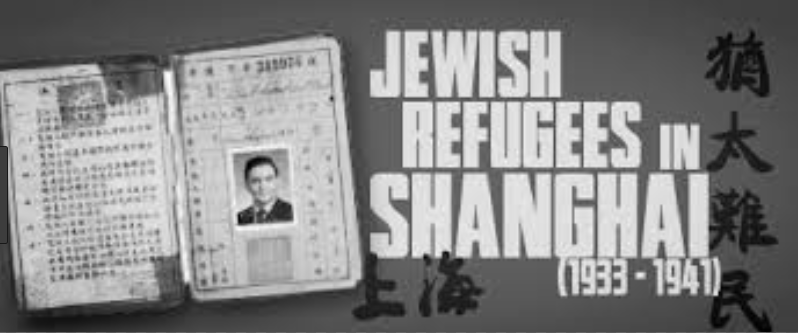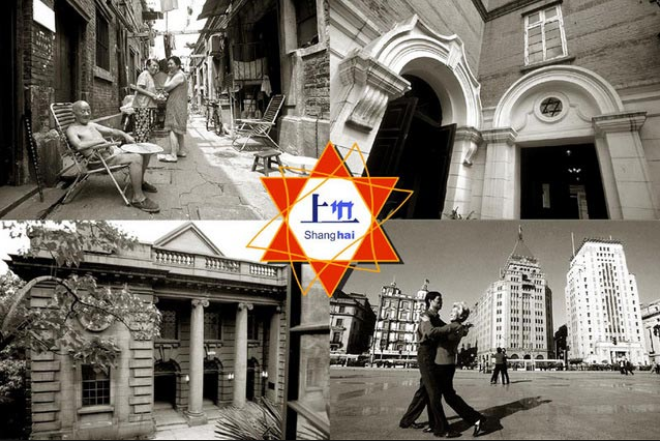
By Todd Bensman, The Dallas Morning News, December 29, 2001
SHANGHAI, China — Just before sundown one Friday, an ancient religious rite unfolded that had all but vanished from China five decades ago.
About two dozen Jews and their bearded rabbi gathered in a plain conference room of a gleaming high-rise hotel, chatting amiably and waiting for the sun to drop the last little bit. Soon, the robust singing of Hebrew prayers ushering in the Sabbath reverberated down the empty hotel hallway.
After an absence of 50 years from mainland China, a seedling community of some 300 American and European expatriate Jews has tentatively taken root amid this nation’s dramatic economic reforms.
The last of Shanghai’s storied Jewish population, including up to 80,000 Jews who found sanctuary here at the peak of World War II, fled after Communists created a socialist-atheist state in 1949.

“We are a growing community and are slowly but surely accomplishing what an average Jewish community will have, just on a smaller scale,” says Rabbi Shalom Greenberg, a New York disciple of the Orthodox Lubavitcher movement, which reaches out to Jews worldwide.
He settled in Shanghai three years ago to start organizing expatriate Jews on long-term work visas. The trappings of a new minority religious community are clear to see: a new kosher bakery to help ease reliance on imported foods, a Hebrew preschool, a Jewish youth club, a ladies group and articles of association for a “Jewish Community of Shanghai.”
The newest Jewish pilgrims coalescing in Shanghai are mostly entrepreneurs and professionals working for multinational corporations. They plod their forebears’ paths with their burdens in a nation where perhaps the broadest familiarity with Jewishness might be limited to Karl Marx and a few stereotypes.
Community leaders have been waging a diplomatically sensitive campaign to have the Chinese government recognize Judaism as one of only a handful of official religions. They want it to grant the community regular access to one of Shanghai’s two historic synagogues that remain intact.
So far, community members say, the government has shown little interest in granting recognition and has only twice — on Rosh Hashana this year and for Hanukkah — permitted religious use of the 80-year-old Ohel Rachel synagogue.

The building is currently occupied by the government’s education ministry. China’s foreign Jews say they have had to be content until now to use foreign-owned hotels and private apartments for the High Holidays, regular bar and bat mitzvahs and weekly Shabbat services.
Greenberg said he is grateful that organized Jewish activity is tolerated at all by a government that historically has regarded organized religions with suspicion — particularly those that seek Chinese converts.
Government authorities officially recognize only a few major religions — including Buddhism, Islam and Christianity — and restrict their practice in ways that have drawn international criticism.
“We have an agreement with the government not to have any Chinese locals attend our functions,” Greenberg said.
The Ohel Rachel synagogue, built in 1921 by Jewish businessman Victor Sassoon, is one of only a few surviving physical monuments that mark what had been a lustrous Jewish presence in pockets of China.
Jews date to ancient times there and, notably, back to the 1850s, when Shanghai was a bustling multinational port city divided among American, British and French interests.
In Shanghai, particularly during the 19th century, Jews began contributing to what would become the city’s legacy of commercial success and cultural diversity.
Under Japanese occupation during the 1930s and 1940s, Shanghai was one of the few jurisdictions in the world willing to accept Jewish refugees from Nazi persecution in Europe.
The Japanese allowed some 30,000 of the Jews to live and practice their faith, albeit in a squalid ghetto called HongKew, despite German exhortations that they all be killed. Most survived the experience but immigrated elsewhere, taking their warm feelings about the Chinese to all corners of the globe.
Others who have returned as tourists in recent years express their appreciation in the visitors book inside Shanghai’s other former temple, the Hongkew Ghetto’s restored 75-year-old Ohel Moishe Synagogue.
The synagogue became a government psychiatric hospital after the communist revolution. Today, the structure remains a government building occasionally opened as a historic monument with no religious function.
“It’s very moving to return to our old home where I spent the war years,” wrote former U.S. Treasury Secretary W. Michael Blumenthal during a July 6 visit to the old ghetto. “Thank you to the HongKew district and the people of Shanghai for their kindness to us and for helping keep the memory alive.”
Wrote Flora Menahamiya: “My father ran away from Austria and came here where the kind people of Shanghai gave him very good treatment.”
Herbert Broh of Oceanside, Calif., who lived in the ghetto from 1939 to 1947, wrote: “My trip to HongKew has taken me back to my childhood with many, many good memories. My wife’s writing a book about my life.”
Many of the Jewish expatriate businessmen and women drawn to Shanghai by reform-driven opportunities seem aware that they have picked up where a grand story left off.
“I feel proud to be a Shanghai Jew,” said Houston native Matt Trusch, 29. “We are part of this new history of China, and I think it will be an important history.”
In seeking to modernize its economy during the past five years, the government has opened China’s doors wide to foreigners of many religions, and in the process has been obliged to tolerate more religious and cultural diversity.
Nowhere has the effort been more transforming than in Shanghai, into which the government and foreign corporations have pumped hundreds of billions of dollars. The infusion, some China watchers suspect, signals a bid for the city to supplant Hong Kong as the world’s finance capital.
Yet, as evidenced by the recent police crackdowns on the Falun Gong sect, the government clearly remains wary of organized religion that it fears might grow strong enough to mount a political challenge someday, China experts said.
Judaism, they say, is likely to become as entrenched in Shanghai as it ever was.
“It was not as easy to practice religion as a community in the past,” said Jan Berris, vice president of the National Committee on U.S.-China Relations. “But as China modernizes and opens to the West, foreign businessmen are coming in, and some of them are Catholics, Jews, Muslims, you name it.
“The government does not want foreigners there proselytizing. But Judaism is not a religion that proselytizes. It’s not a threat to the government.”